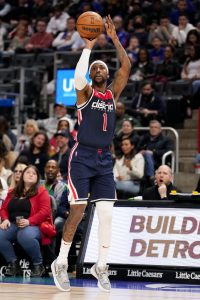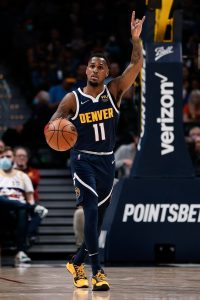This is the third in our series breaking down the major trades of the 2022 offseason. As opposed to giving out grades, this series will explore why the teams were motivated to make the moves. Let’s dig into a pair of transactions made by the Nuggets, including a four-player deal with the Wizards…
One of the advantages of exploring trades a few weeks after they occur is that you have the benefit of hindsight and a clearer view of a team’s big-picture focus. The Nuggets went into the offseason with the goal of improving their perimeter size, athleticism, defense and depth, so let’s take a look at some of the moves they’ve made to accomplish their intended goal.
First, the Nuggets traded JaMychal Green to the Thunder. Green had been a solid player for the past handful of seasons, but his three-point shooting cratered in his second year with Denver, dropping to 26.6% – a full 10% below his career rate of 36.6% – and with the impending return of Michael Porter Jr., plus Zeke Nnaji, Aaron Gordon and Jeff Green already at the forward spots, JaMychal became an expendable piece.
The Nuggets accomplished a few different things with the deal: they moved off Green’s mid-sized contract and created a roster spot; acquired the 30th pick (used to select Peyton Watson) and a couple of future second-rounders (2023 and 2024); and created a $8.2MM traded player exception (the amount of Green’s 2022/23 salary).
The Thunder used some of their cap space to essentially punt the last pick of the first round to 2027 (top-five protected from 2027-29) in the hope that Denver’s pick will be of greater value than the last pick of the first round in 2022. Green is unlikely to ever play for the Thunder, so it’s possible they could get a second-round pick of their own if they move him, but would probably have to take on an unwanted contract in the process.
In the draft, the Nuggets selected Christian Braun with their own first-rounder (21st), an experienced, athletic wing who helped Kansas win the NCAA tournament in 2021/22. Head coach Michael Malone has praised Braun, implying that he might have a regular role as a rookie.
As previously noted, the 30th pick was used on Watson, another athletic wing with good size (6’8″). Watson was a McDonald’s All-American in high school yet rarely saw on-court action during his freshman season at UCLA, but obviously the Nuggets were high on him and he showed flashes of upside during Summer League.
 Those moves essentially served as a preamble to Denver’s major trade with Washington, sending Monte Morris and Will Barton to the Wizards in exchange for Kentavious Caldwell-Pope and Ish Smith.
Those moves essentially served as a preamble to Denver’s major trade with Washington, sending Monte Morris and Will Barton to the Wizards in exchange for Kentavious Caldwell-Pope and Ish Smith.
In a vacuum, without thinking about roster construction, it seems like the Nuggets might have been able to get more in return for two players who started last season. So why didn’t they?
A key aspect of this trade are the salaries involved. Morris is under contract at a reasonable rate – $9.1MM in ‘22/23, $9.8MM in ‘23/24 – while Barton is on an expiring deal worth $14.4MM.
Caldwell-Pope was recently extended for two seasons (with a player option in year two) after the Nuggets indicated at the time of the deal that they wanted to keep him around. For the upcoming season, he’ll make $14MM, while Smith is on expiring $4.7MM deal.
The Nuggets project to be a taxpayer next season, so shedding about $4.77MM in salary in the deal was certainly a factor, especially for a team that could be facing the repeater tax (and stiffer penalties) in subsequent seasons.
Morris is one of the top backup point guards in the league and capably served as a low-end starter last season. But with Jamal Murray projected to return to the lineup in the fall and Bones Hyland emerging as a rotation piece as a rookie, the backcourt – particularly for the smaller guard spot – was looking pretty crowded. That’s not to say the Nuggets didn’t value Morris – far from it. But the Wizards needed a point guard, and they got a good one in Morris.
Barton had been with Denver for eight years, making him the team’s longest-tenured player. While his production looked solid on paper – he averaged 14.7 PPG, 4.8 RPG and 3.9 APG on .438/.365/.803 shooting in 71 games (32.1 MPG) last season – a series of injuries have sapped his athleticism, and he’s a subpar defender with questionable shot selection.
Caldwell-Pope was the primary target for the Nuggets, as evidenced by his recent extension. He doesn’t need the ball in his hands to be effective on offense, has developed into a very good spot-up shooter, and is a solid defender. He should be a very nice complementary piece and will take over some of the defensive assignments that were perhaps given to Gordon too often last season.
The Nuggets surely haven’t forgotten battling against Caldwell-Pope in the Western Conference Finals a couple of seasons ago, and they’ve said they value his championship experience and defense. KCP was the third-best player when the Lakers won the title in 2020, bringing a new element to a Denver squad that aspires to reach those same heights in ‘22/23.
The veteran backup Smith, who will break a league record by playing for his 13th NBA team once he appears in a game for Denver, will likely serve as a backup to Murray and Hyland. However, since the Nuggets plan to ease Murray back into action, there’s a real chance Smith could get regular minutes in the upcoming season, so he wasn’t just a throw-in piece.
Based on the return the Nuggets received, it appears that Barton’s contract was viewed as a negative asset by opposing teams. Morris was the main trade chip here, but he wasn’t projected to start next season and could reasonably be viewed as a luxury rather than a necessity, particularly since Caldwell-Pope is the best defender of the group and a cleaner fit for Denver’s starting lineup.
During free agency, Denver’s biggest signing was adding Bruce Brown via the taxpayer mid-level exception. The 25-year-old is the type of player who doesn’t need the ball on offense and can switch onto virtually anyone defensively, making him an ideal fit for a team that has been looking to upgrade its defense. He’s a solid rebounder and passer and very strong for his size – he also reportedly had offers for more money, but chose the Nuggets due to fit.
The Nuggets also promoted Davon Reed, another strong defender who shot 43% from deep while on a two-way contract last season, to a minimum-salary deal. The other free agency moves were re-signing Vlatko Cancar, a restricted free agent who hasn’t seen much action during his three seasons, and signing DeAndre Jordan to a minimum deal. I didn’t love the Jordan signing, but for the sake of Nuggets fans, maybe he won’t play much.
So far this offseason, the Nuggets have essentially replaced JaMychal Green, Morris, Barton, Facundo Campazzo, Bryn Forbes, Austin Rivers, and DeMarcus Cousins with Caldwell-Pope, Smith, Braun, Watson, Brown, Reed (now playoff-eligible), and Jordan. I would definitely say they’ve accomplished their goal of improving the team’s perimeter size, athleticism, defense and depth.
The Wizards, meanwhile, entered the offseason intent on re-signing Bradley Beal and bolstering the backcourt around him, particularly at point guard.
Their first move came in the draft, when they selected Wisconsin guard Johnny Davis with their lottery pick (10th overall). It’s unclear how much playing time Davis will receive as a rookie, but some evaluators viewed him as a combo guard who could bring some much-needed toughness to D.C.
Then came the deal with the Nuggets. As previously mentioned, in a vacuum, based on production both last year and over the previous seasons, it’s hard to not view this trade as a win for the Wizards.
 Morris was the clear target, a 27-year-old point guard who averaged averaged 12.6 PPG, 3.0 RPG and 4.4 APG on .484/.395/.869 shooting in 75 games (29.9 MPG). On top of his solid shooting efficiency, Morris is one of the best in the league at taking care of the ball, with a career assist-to-turnover ratio of 4.77:1.
Morris was the clear target, a 27-year-old point guard who averaged averaged 12.6 PPG, 3.0 RPG and 4.4 APG on .484/.395/.869 shooting in 75 games (29.9 MPG). On top of his solid shooting efficiency, Morris is one of the best in the league at taking care of the ball, with a career assist-to-turnover ratio of 4.77:1.
According to Mike Singer of The Denver Post, the Nuggets received more than 20 calls inquiring about Morris, so he was clearly in-demand around the league.
The Wizards also got a buy-low candidate in Barton, who had similar offensive production to Caldwell-Pope and will provide depth on the wing. Both players are familiar with head coach Wes Unseld Jr., who used to be an assistant with the Nuggets.
The next major domino fell when the team re-signed Beal to a five-year, $251MM maximum-salary deal that includes a no-trade clause – a rarity in the NBA.
The Wizards also signed Delon Wright to a two-year, $16MM deal in free agency to further bolster the point guard position. Like Morris, Wright is a sometimes reluctant shooter despite solid averages (.453/.354/.799 career split), but he does a good job taking care of the ball.
Wright possesses excellent size at 6’5” and has a knack for being in the right place at the right time and making good decisions. I also personally rate him as one of the best point guard defenders in the league, which made him an attractive option for several teams in free agency. He recently said he joined the Wizards due to a chance at an expanded role.
Morris, Barton and Wright all have multiple seasons of playoff experience under their belts, which must have been attractive to a Wizards team that has missed out on the postseason in three of the last four seasons.
So far this offseason, the Wizards have swapped out Raul Neto, Tomas Satoransky, Caldwell-Pope and Smith for Davis, Morris, Barton and Wright. Like the Nuggets, I would say the Wizards have also accomplished their goal of improving their backcourt rotation and depth, particularly at point guard.
Essentially, I view the Nuggets/Wizards swap as a win for both teams and as a deal that contributed to clear upgrades in the clubs’ respective areas of emphasis.

Like if you think it was a terrible trade for the Nuggets.
Heads I win…
Like if you think it was a great trade for the Wizards.
Tails you lose…
I agree with the article that the trade was good for both teams. It was hard to give up KCP who is particularly valuable during a playoff run and Ish has been outstanding for the Wizards. Given the players we have at forward we don’t need Barton to deliver high numbers. He adds excellent passing and may be more efficient than KCP. The key here is team cohesiveness and more ball movement. The past two years showed we are successful when there are not many isoball plays and where there is lots of ball movement. Barton and Morris should add to defensive cohesiveness as well. They are familiar with Unseld’s system and we needed less individual defense and more team defense. With strong team defense we will finish mid pack in the playoffs picture and have a real shot. Without it, we will go nowhere. We will now see how good a coach Unseld is.
Denver should of traded Gordon ( poor man’s Blake Griffin) and someone else for defensive PF and a better SG and have Barton and Morris off the bench but whatever